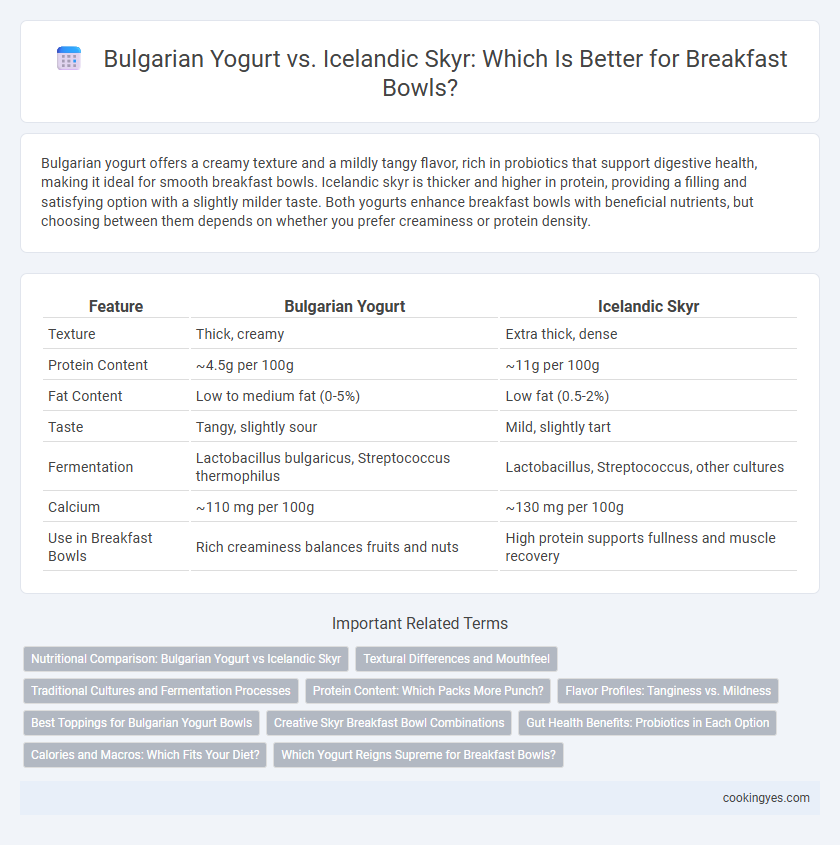Bulgarian yogurt offers a creamy texture and a mildly tangy flavor, rich in probiotics that support digestive health, making it ideal for smooth breakfast bowls. Icelandic skyr is thicker and higher in protein, providing a filling and satisfying option with a slightly milder taste. Both yogurts enhance breakfast bowls with beneficial nutrients, but choosing between them depends on whether you prefer creaminess or protein density.
Table of Comparison
| Feature | Bulgarian Yogurt | Icelandic Skyr |
|---|---|---|
| Texture | Thick, creamy | Extra thick, dense |
| Protein Content | ~4.5g per 100g | ~11g per 100g |
| Fat Content | Low to medium fat (0-5%) | Low fat (0.5-2%) |
| Taste | Tangy, slightly sour | Mild, slightly tart |
| Fermentation | Lactobacillus bulgaricus, Streptococcus thermophilus | Lactobacillus, Streptococcus, other cultures |
| Calcium | ~110 mg per 100g | ~130 mg per 100g |
| Use in Breakfast Bowls | Rich creaminess balances fruits and nuts | High protein supports fullness and muscle recovery |
Nutritional Comparison: Bulgarian Yogurt vs Icelandic Skyr
Bulgarian yogurt contains live Lactobacillus bulgaricus and Streptococcus thermophilus cultures, providing probiotics beneficial for digestion, with around 5-6 grams of protein per 100 grams and moderate fat content. Icelandic skyr is strained, resulting in a thicker texture with higher protein levels, typically 10-12 grams per 100 grams, and lower fat content, making it ideal for weight management and muscle repair. Both options are rich in calcium and low in sugar, but skyr's protein density offers superior satiety for breakfast bowls.
Textural Differences and Mouthfeel
Bulgarian yogurt features a creamy, smooth texture with a slightly tart flavor, providing a rich and velvety mouthfeel ideal for breakfast bowls. Icelandic skyr offers a thicker, denser consistency with a mild tang, creating a firm yet creamy sensation that holds toppings well. The contrasting textures make Bulgarian yogurt suited for a softer, silkier base, while skyr delivers a more substantial, spoonable experience.
Traditional Cultures and Fermentation Processes
Bulgarian yogurt is renowned for its use of Lactobacillus bulgaricus and Streptococcus thermophilus bacteria, creating a thick, tangy texture through a traditional fermentation process dating back millennia. Icelandic skyr, while technically a cheese, undergoes a unique straining and fermentation method with cultures like Streptococcus thermophilus and Lactobacillus delbrueckii subsp. bulgaricus, resulting in a high-protein, creamy consistency. These distinct traditional cultures and fermentation techniques influence their flavor profiles and nutritional benefits, making each ideal for nutrient-dense breakfast bowls.
Protein Content: Which Packs More Punch?
Bulgarian yogurt contains approximately 5-6 grams of protein per 100 grams, offering a creamy texture rich in probiotics ideal for digestive health. Icelandic skyr, traditionally strained, delivers a higher protein concentration, providing around 10 grams per 100 grams, making it a preferred choice for muscle recovery and satiety. Choosing Icelandic skyr over Bulgarian yogurt maximizes protein intake in breakfast bowls without compromising taste or texture.
Flavor Profiles: Tanginess vs. Mildness
Bulgarian yogurt offers a pronounced tanginess with a rich, creamy texture that enhances breakfast bowls by adding bold, refreshing flavors. Icelandic skyr is known for its mild, slightly sweet taste and thick consistency, providing a smooth, subtle base ideal for those seeking a less tart option. Choosing between the two depends on whether a tangy or mild flavor profile better complements your morning ingredients and personal preference.
Best Toppings for Bulgarian Yogurt Bowls
Bulgarian yogurt, known for its creamy texture and tangy flavor, pairs exceptionally well with toppings like fresh berries, honey, and walnuts, enhancing its probiotic benefits and natural tartness. Rich in Lactobacillus bulgaricus and Streptococcus thermophilus cultures, it complements nutrient-dense add-ons such as chia seeds, sliced almonds, and seasonal fruits, which boost fiber and antioxidant intake. Unlike Icelandic skyr, which is thicker and milder, Bulgarian yogurt bowls thrive with vibrant, textured toppings that balance its unique flavor profile.
Creative Skyr Breakfast Bowl Combinations
Icelandic skyr offers a creamy, high-protein base perfect for creative breakfast bowls, blending well with fresh berries, chia seeds, and a drizzle of honey to boost flavor and nutrition. Bulgarian yogurt, known for its rich probiotic content and tangy taste, pairs excellently with nuts, pomegranate arils, and a sprinkle of cinnamon for a gut-friendly morning meal. Both options provide unique textures and health benefits, allowing for versatile breakfast bowl combinations tailored to taste preferences and dietary needs.
Gut Health Benefits: Probiotics in Each Option
Bulgarian yogurt contains Lactobacillus bulgaricus and Streptococcus thermophilus, probiotics known for enhancing gut flora diversity and improving digestion. Icelandic skyr, while thick and high in protein, features fewer probiotic strains but still supports gut health by promoting beneficial bacteria growth. Choosing Bulgarian yogurt may offer more robust probiotic benefits, aiding in better digestion and immune system support in breakfast bowls.
Calories and Macros: Which Fits Your Diet?
Bulgarian yogurt typically contains fewer calories and higher protein content compared to regular yogurt, with approximately 59 calories and 10 grams of protein per 100 grams, making it a great option for low-calorie, high-protein diets. Icelandic skyr is even richer in protein, providing around 62 calories and 11 grams of protein per 100 grams, appealing to those focused on muscle gain or satiety while maintaining low-fat content. For balanced breakfast bowls, choosing Bulgarian yogurt suits low-calorie plans, whereas skyr fits high-protein, muscle-building goals without excessive carbohydrates or fats.
Which Yogurt Reigns Supreme for Breakfast Bowls?
Bulgarian yogurt boasts a rich, creamy texture with high probiotic content, making it ideal for gut health and a smooth breakfast bowl base. Icelandic skyr offers a thicker, high-protein option with lower fat, supporting muscle recovery and prolonged satiety. For nutrient-dense breakfast bowls, skyr's protein superiority edge contrasts with Bulgarian yogurt's probiotic benefits, guiding choice based on dietary goals.
Bulgarian yogurt vs Icelandic skyr for breakfast bowls Infographic

 cookingyes.com
cookingyes.com